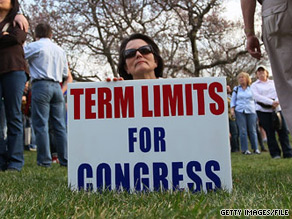Large majority continues to support congressional term limits

A large majority of voters across the political spectrum continues to believe that term limits should be imposed upon members of Congress. The poll numbers serve as yet another indication that the political system needs an injection of fresh competition.
The latest Rasmussen Reports survey found that 71% of Likely U.S. voters favor establishing term limits for all members of Congress. Only 14% of these likely voters oppose such limits, and only 15% are undecided on the issue. Rasmussen asked the following in its national telephone survey conducted from September 22-23 of 1,000 likely voters: "Do you favor or oppose establishing term limits for all members of Congress?"
Rasmussen noted that voter support for term limits has remained high since a 1995 U.S. Supreme Court ruling that dealt with the issue. In the 5-4 ruling named U.S. Term Limits v. Thornton, the high court ruled that individual states did not have the right to place limits on its representatives stricter than what's specified in the U.S. Constitution. Practically, that ruling entailed that Congress is the only authority that can place limits on itself. Currently, Congress can place term limits on itself, but must approve any such amendment by a two-thirds vote.
A hint that voters expect two-party gridlock to continue with the same career politicians is that 75% believe that Congress is unlikely to limit how long members serve in Congress. That figure includes 27% of voters who say that this is "Not At All Likely" to happen.
"Voters recognize that expecting Members of Congress to place reasonable limits on themselves is like expecting toddlers to select a reasonable bedtime," said pollster Scott Rasmussen, the president of Rasmussen Reports.
Overwhelmingly, the poll's data found that the majority of voters who support term limits agrees with the statement that "once someone is in office too long, they start looking out for themselves and their friends more than the interests of the people."
With the absence of a strong third party, or even more parties, the perception certainly exists that the two main parties take voter support for granted. It isn't any wonder that most voters surveyed in previous Rasmussen data believe that the system of choosing representatives is rigged to benefit incumbents. In addition, few voters believe that representatives earn re-election by serving their constituents well.
While more Republicans display stronger support for term limits than either unaffiliated voters or Democrats, a majority of Mainstream voters (82%) support term limits for members of Congress. A large part of the ire directed toward the two major parties seems to focus on party leadership. A majority of likely voters at 57% hold an unfavorable opinion of California Congresswoman and former House Speaker Nancy Pelosi. Although voters are more satisfied with Republican leadership, the data indicates that such satisfaction is really an overstatement. The voting public's disapproval of House Speaker John Boehner is still higher than his approval by 46%-34%. Likewise, unfavorable sentiment outweighs favorable sentiment for Senate Majority Leader Harry Reid and Senate Minority Leader Mitch McConnell. What's clear at the present moment is that most of the current, career politicians have a big hole to dig themselves out of in order to restore confidence in the two-party system.
Rasmussen's survey regarding congressional term limits has a margin of sampling error of +/- 3 percentage points, with a 95% level of confidence.




